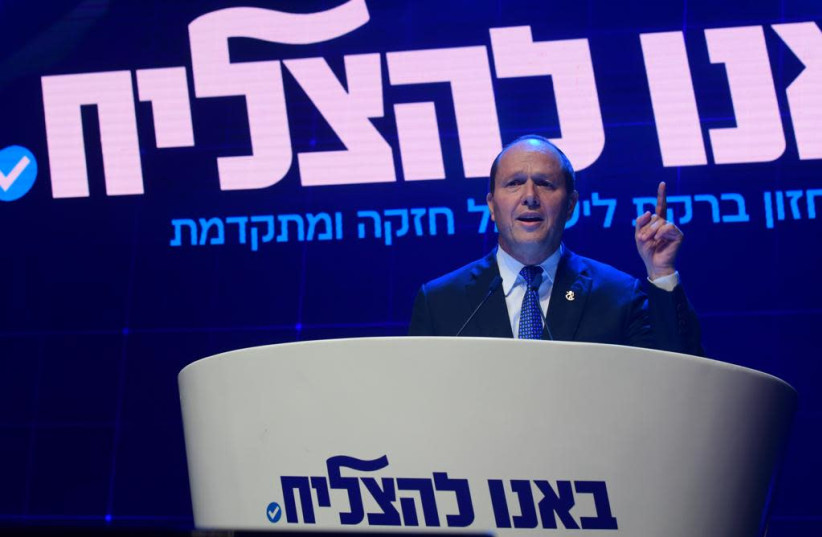Despite being named in a massive trove of documents that allege financial wrongdoing, Likud MK Nir Barkat is likely to emerge unscathed and perhaps even become more popular among right-wing Israeli voters, political analysts believe.
The International Consortium of Investigative Journalists (ICIJ) on Sunday released some 12 million documents about hidden offshore tax haven assets of hundreds of public officials, politicians and billionaires from around the globe. Known as the Pandora Papers, the leak is the biggest of its kind and featured several prominent leaders, such as former British Prime Minister Tony Blair and Jordan’s King Abdullah. Over 600 journalists from 117 countries took part in the massive exposé.
The documents also mentioned the names of 565 Israelis, according to Shomrim, an Israeli nonprofit investigative journalism organization that collaborated in the investigation.
Among them are Likud MK and former Jerusalem Mayor Nir Barkat.
Barkat, the wealthiest member of Israel’s parliament, is considered to be a potential successor to former PM Binyamin Netanyahu and recently said that he hopes to lead the Likud party once Netanyahu retires. In 2019, business magazine Forbes Israel estimated Barkat’s net worth at roughly NIS 500 million ($139 million).

Prof. Gideon Rahat, a senior fellow at the Israel Democracy Institute and professor of political science at the Hebrew University of Jerusalem, said that the Pandora Paper revelations were unlikely to harm Barkat’s career.
“There are two political forces in Israel: one from the center-left that is anti-corruption and one on the right, which is not pro-corruption but is populist [in nature],” Rahat told The Media Line. “Because of populism, politicians on the right will always claim that it’s not a real thing, or that it’s the media or the deep state, or whatever.”
Because Barkat happens to be on the right of the political spectrum, the exposé could actually prove to be politically expedient for him, Rahat argued.
“It might help him, when you put it in the context of populism,” he said. “As long as Barkat belongs to the Likud this won’t work against him.
“I don’t think he will get hurt and if he follows in the steps of Netanyahu, he might even make a political fortune out of him being the new Dreyfus,” Rahat said, referring to the infamous political scandal that rocked France in the late 19th century.
According to the ICIJ’s investigative report, Barkat held shares in a British Virgin Islands shell company via three companies that own the Russian, British and Israeli subsidiaries of the online trading platform eToro. Founded in Israel, eToro is also set to be listed on Nasdaq through a SPAC merger in the coming months at a valuation of $10 billion, which would effectively make Barkat a billionaire, Israeli new site Globes reported.
It is important to note that having a company registered in a tax haven does not violate Israeli law. However, the Pandora Papers also allege that Barkat continued to hold shares under his name when he was mayor of Jerusalem and only transferred them over to his brother and business partner Eli Barkat in 2019, when he was elected to the Knesset. Knesset Ethics Committee guidelines stipulate that MKs are required to transfer shares to a public trust company and not to a close relative.
Shortly after the leaks were published, Barkat’s office issued a statement to the effect that “when he entered the public sphere 18 years ago, he transferred the management of all his businesses to his brother, and when he was elected to the Knesset, he filed blind trust documents along with a full declaration of capital to the Ethics Committee and asked for its guidance.”
The statement also referred to Pandora Papers as being politically motivated and slammed the investigation as “ridiculous.”
For its part, Shomrim, one of the organizations that worked on the Pandora Papers investigation, decried what it called a “very significant lack of transparency when it comes to offshore companies.”
Shomrim Editor-in-Chief Eyal Abrahami told The Media Line that while he is unsure what kind of impact the report will have on Barkat’s political ambitions, it might lead to Israeli politicians reconsidering using tax havens.
“I don’t personally think that an individual is obligated to look for ways to pay higher taxes, but I do think that using tax havens really harms countries that need these taxes and this income that they are essentially not receiving,” Abrahami said, adding that public figures should be required to properly disclose the nature of the trust agreements that they are party to.
“With regards to Barkat, he had spoken about a blind trust but did not provide any details, and when we started to investigate this, we found out that there are several layers that are much more complicated than a simple blind trust,” he continued. “I do hope that politicians looking to avoid conflicts of interest in the future will think twice and do things according to guidelines.”
